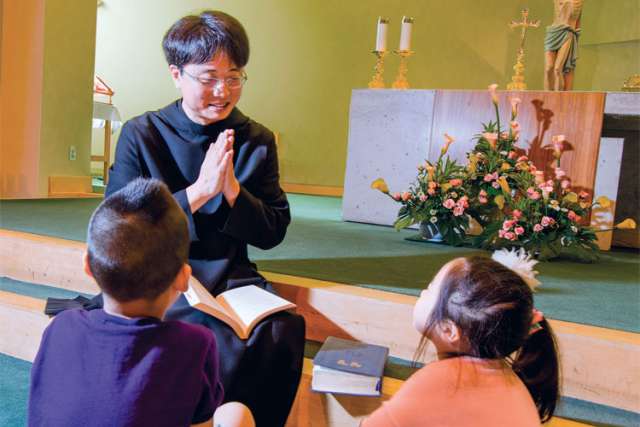“Evangelization is very important,” said the Benedictine monk. “Catholic spirituality can contribute to making peace ... (and) in South Korea we need that peace.”
Park, ordained 12 years ago in South Korea, came to Canada in 2010 to pursue a PhD in inter-religious dialogue from Regis College at the University of Toronto. When not studying, Park celebrates Mass in Korean at a number of the parishes in the Archdiocese of Toronto.
Despite anticipating another four years in Canada before completing his PhD, Park said he is anxious to return to evangelizing on Korean soil.
“Spirituality and peace are very important,” said Park, noting that about half of the Korean population considers itself non-religious. “We need to change minds. The more spirituality grows and grows, the more and more our lives will be changed.”
But growing the flock of faithful in South Korea requires a different tactic than Park sees clergy in North America employing.
“Evangelization in South Korea is a little bit different than here,” he said. “Westerners have more of an individualism culture whereas in South Korea community is the important thing as well as communication.”
Although Catholicism began breaching the Korean borders in the 18th century, long before the nation was split along the north and south divide, it took more than 50 years before the first priests, French missionaries, arrived in 1836. Despite the priestly presence on the peninsula during the 19th century the Catholic Church faced persecution from the ruling Joseon Dynasty, primarily due to the faith’s rejection of ancient worship practices.
Resilient, the local Catholics mimicked Jesus Christ by enduring the suffering imposed on them and continued to slowly expand. Catholics now make up slightly more than 10 per cent of the population of about 50 million with more than 4,900 priests and 1,668 parishes serving an area comparable in size to Ontario.
Over the last decade the Church in Korea has recorded an increase in the pews of about 70 per cent with about 85,000 joining the faith in 2012 alone. Park credited this recent boom to a positive public perception of Catholicism, the Church as an institution and those who practice the faith.
“It is amazing the increase in believers,” said Park. “Many Koreans have a good image of Catholics ... (because) they do many things for the poor. The Korean Catholic Church works for social justice.”
Park praised Pope Francis for his papal visit to South Korea in August.
“He gave hope for the future.”
Prior to the Pope’s visit an invitation to allow North Korean delegates across the border to take part in the visit was issued by the South. North Korea rejected the offering.
Although the Korean War ceasefire has more or less held since July 27, 1953, Park said the two countries never reached peace but rather simply stopped physically fighting each other.
“To not have any wars is not peace,” he said. “Peace is to have conversations with each other.”
An increased Catholic presence in South Korea could lead to genuine peace between the divided Korean neighbours, he said. That’s why Park, 42, will pay extra attention to evangelizing South Korean youth.
“The younger generation is very important for the Church’s future in South Korea,” he said.


